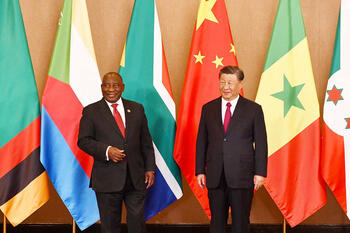
The West is about to get its comeuppance – if it does not wake up. The balance of the world economy is shifting decisively to what was once seen as the Third World, a shift led by China and, to a lesser extent, India. It is a dynamic that China hopes to exploit in order to replace America as the new global rule-maker. One region in particular is at the centre of China’s economic and geopolitical plans: Africa.
The rise of Africa, which now has 11 of the world’s 20 fastest-growing economies, is only just beginning. And China’s strategy is clearly focussed on harvesting Africa’s growing wealth, while sidelining the US and the diminished former European powers. In 2023, the EU’s then foreign-affairs and security-policy chief, Josep Borrell, warned that, ‘Little by little, we are losing Africa’.
Africa’s importance begins with its unparalleled resource endowments, particularly in critical minerals. These are used to power everything from fighter jets to smartphones. The Democratic Republic of Congo alone controls over 70 per cent of the world’s cobalt reserves – a critical mineral used in electric-vehicle batteries and jet engines. South Africa boasts over 80 per cent of global platinum and 70 per cent of the world’s chromium, minerals without which we couldn’t make jewellery, car exhausts or most industrial applications.
These strategic materials provide the foundation for modern technological civilisation, and China has systematically secured preferential access through long-term partnerships that exclude American and other Western competitors. Beyond critical minerals, the continent also has substantial deposits of oil, natural gas, diamonds and gold. Nigeria and Angola are among the top 20 oil-producing nations, while Mozambique’s liquefied-natural-gas reserves promise to reshape global energy markets. China has invested heavily in all three countries. In recent years, it has also upped its investment in oil-rich Libya, a major producer once aligned with Europe.
African agriculture is also strategically important. With 60 per cent of the world’s uncultivated arable land, Africa represents the world’s last major frontier for agricultural expansion. Perennially facing ‘food-security concerns’, China has recognised this potential, and is investing heavily in African agricultural infrastructure and securing long-term food-supply agreements. This will reduce China’s dependence on American agricultural exports while positioning itself as Africa’s primary food-security partner.
Most importantly, Africa is producing the one critical asset that the world economy needs most: people. While China’s population is projected to decline, falling to 1940s levels by 2100, Africa’s population is heading in the opposite direction. It is projected to double to 2.5 billion by 2050, with the median age remaining below 25 throughout this period. Critically, Africa is predicted to be home to 25 per cent of all working-age adults by 2050.
Given Africa’s vast resources, agricultural potential and population growth, one would think Western capitalists and their governments might be seeking to invest in Africa. But instead, the African economy has acquired a distinctly Chinese cast, with little competition from the West. Beijing’s approach to Africa represents the most comprehensive foreign-engagement strategy on the continent since European colonialism.
Read the rest of this piece at: Spiked.
Joel Kotkin is the author of The Coming of Neo-Feudalism: A Warning to the Global Middle Class. He is the Roger Hobbs Presidential Fellow in Urban Futures at Chapman University and and directs the Center for Demographics and Policy there. He is Senior Research Fellow at the Civitas Institute at the University of Texas in Austin. Learn more at joelkotkin.com and follow him on Twitter @joelkotkin.
Bheki Mahlobo is an economist at Cronje Private Clients. He specialises in economic and financial markets research as well as political trend analysis.
Photo: President Cyril Ramaphosa and President Xi Jinping Co-Chair the China - Africa Leaders Round Table; GovernmentZA, via Flickr, CC 4.0 License.












